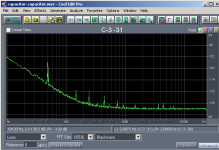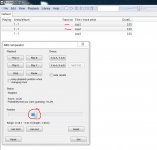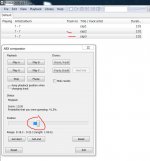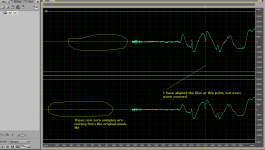Karl, thank you very much for your willingness to post screenshot results here.
In this test, I did my best to prepare technically correct files. IMO, it will be very difficult, if not impossible, to discern the capacitors used by listening only.
I am thinking about posting the difference sound files, between Mundorf and Roederstein, and between same capacitor recorded two times. I would appreciate your thoughts on this idea.
In this test, I did my best to prepare technically correct files. IMO, it will be very difficult, if not impossible, to discern the capacitors used by listening only.
I am thinking about posting the difference sound files, between Mundorf and Roederstein, and between same capacitor recorded two times. I would appreciate your thoughts on this idea.
I thought I could detect differences but the results show otherwise. I would go "play A", "play A", "play A" and then play X or Y and think... same... or different, and vote... but it seems the differences are not real to be audible. Imagination 
I don't see why not on posting the files. It could be informative. Would it need boosting in level to make it audible ? very small amplitude.
I don't see why not on posting the files. It could be informative. Would it need boosting in level to make it audible ? very small amplitude.
I would prefer not to manipulate with the difference files. Further amplification and (math) truncation may result in further "new" spectral components that would confuse the issue. I can hear both background noise and sonic difference (sonic difference only in one of the files) with headphones, but my headphone amplifier has higher gain than usual and high power.
I have noticed one interesting phenomenon. The difference file between two takes from the same capacitor produced some audible chirps on my backup sound system (you know my listening room was under reconstruction and I was listening in my office only). The backup system has much higher distortion than my main system. When I returned to my main system, and also with headphones, I found only sound similar to white noise. My backup system has created some intermodulations that sounded like chirping tones.
I will post the difference files.
I have noticed one interesting phenomenon. The difference file between two takes from the same capacitor produced some audible chirps on my backup sound system (you know my listening room was under reconstruction and I was listening in my office only). The backup system has much higher distortion than my main system. When I returned to my main system, and also with headphones, I found only sound similar to white noise. My backup system has created some intermodulations that sounded like chirping tones.
I will post the difference files.
OK Jay. This is a hobby, so I can have some view from above  , though I do not think that your behavior here was decent enough. I would appreciate if you emailed me first, emails do allow attachments.
, though I do not think that your behavior here was decent enough. I would appreciate if you emailed me first, emails do allow attachments.
I did not know about that revealing option of foobar. So we have to appreciate your revelation, for the reason that someone else might use it as well to get his result.
You and Barleywater were the only one who declared my files correctly. As Barleywater is excellent in file analysis, I assume he has analyzed difference files. This is OK, as far as the result remains on the floor of PM's or emails.
I did not know about that revealing option of foobar. So we have to appreciate your revelation, for the reason that someone else might use it as well to get his result.
You and Barleywater were the only one who declared my files correctly. As Barleywater is excellent in file analysis, I assume he has analyzed difference files. This is OK, as far as the result remains on the floor of PM's or emails.
The test is closed, no one has sent a correct result based on listening and supported by a valid ABX result. I am also unable to get a non-manipulated ABX result, based on listening only. To me, there was no difference between Mundorf MCap ZN and Roederstein MKT1813 detectable by listening only, in my test and with my hardware available.
Thank you all who have participated in my test.
The result:
cap1 = cap2, only different take
cap3 = different capacitor
There is a last question. Which was Mundorf and which was Roederstein? No ABX feature will tell it, at least at my knowledge, but I may be wrong again.
Thank you all who have participated in my test.
The result:
cap1 = cap2, only different take
cap3 = different capacitor
There is a last question. Which was Mundorf and which was Roederstein? No ABX feature will tell it, at least at my knowledge, but I may be wrong again.
Last edited:
There is a last question. Which was Mundorf and which was Roederstein? No ABX feature will tell it, at least at my knowledge, but I may be wrong again.
Yes, i think that's a good question!
I'm very disappointed of this file analysis capability, because I'm one of the main person who have the idea that small differences are audible, but now I cannot prove it because there is a possibility that I'm cheating.
But I'm not that pessimistic. There's a way (I believe) to adjust or randomize gain (hint: Mooly's files, the same files do not necessarily have exactly the same gain/peak).
Which one Mundorf and which one ROE, is a GREAT QUESTION, because I AM one of the believers that boutique caps DO sound better. I'm not familiar with Mundorf, but I know that Auricap is better than the ROE, and Auricap has that bright/detail characteristics. So I expect Mundorf is better sounding than the ROE. And SILVER has a unique character as well. So I wish/believe we have better listening test scheme here.
So, have you prefered cap1 or cap3 ?
Okay I will give a listen to both files. Actually my ultimate test is the "fatigue" test, that I will run if I have to choose between two options for my system. It is to listen (one file) for one day while sleeping and assess during sleeping and waking up in the morning for disturbing phenomenon.
If the Mundorf is Auricap, I think I will guess which one is the Auricap. But here I believe that Mundorf is better than the ROE so my preference "should" be for Mundorf.
I will try...
UPDATE:
In less than 10 seconds listening for each file I already prefer file1. That's the Mundorf? If I'm wrong next time I will listen for longer time. I wish you have a way to show distortion of both files so we can assume that lower distortion should be preferred?
Last edited:
As file1 you mean cap1?
I am note telling which is Mundorf and which is Roederstein yet, for the others to have a chance to express their impressions.
You are asking for measurements, most of my available measurements I have already shown in this thread and I do not think I will be repeating myself. The thread still has only 6 pages. Maybe, just maybe I may have some indications, but nothing reliable, yet.
I am note telling which is Mundorf and which is Roederstein yet, for the others to have a chance to express their impressions.
You are asking for measurements, most of my available measurements I have already shown in this thread and I do not think I will be repeating myself. The thread still has only 6 pages. Maybe, just maybe I may have some indications, but nothing reliable, yet.
With E-MU 0404 residual music is just discernible in difference file of cap-cap, and more so with difference file rodenstein-mundorf.
I think you will find both capacitors have significant transducer properties. Recordings made while gently tapping, stroking, and perhaps just shouting at from close distance will make distinct recording. Likewise, across power amplifier they will sing along with whatever you play. Which is higher sensitivity transducer? Which one is more easily squeezed? Which one has more charge redistribution for a given volume of surface displacement?
Scanned spectrum feature of Cool Edit/Audition reveals mains and harmonics with Cap-Cap difference file:

I didn't use difference file technique in differentiating Cap1-3, but this certainly works in this case.
Pavel,
How did you determine start points of cap1-3? Are they at first non zero/non dither only point of captured signals?
I think you will find both capacitors have significant transducer properties. Recordings made while gently tapping, stroking, and perhaps just shouting at from close distance will make distinct recording. Likewise, across power amplifier they will sing along with whatever you play. Which is higher sensitivity transducer? Which one is more easily squeezed? Which one has more charge redistribution for a given volume of surface displacement?
Scanned spectrum feature of Cool Edit/Audition reveals mains and harmonics with Cap-Cap difference file:

I didn't use difference file technique in differentiating Cap1-3, but this certainly works in this case.
Pavel,
How did you determine start points of cap1-3? Are they at first non zero/non dither only point of captured signals?
As file1 you mean cap1?
I am note telling which is Mundorf and which is Roederstein yet, for the others to have a chance to express their impressions.
Yes, cap1.
Okay, so Mundorf has 0.00031% and ROE has 0.00037%. That's a "big" difference imo (I believe that measurement audibility is underrated). So Mundorf should sound better and my preference.
Pavel,
How did you determine start points of cap1-3? Are they at first non zero/non dither only point of captured signals?
I have aligned the files according to image attached. In fact more zoomed and the point were I aligned them was sample no. 2296. I have deleted the blank space in each file, before the start of music, to always get this sample at 2296. The first non-zero and non-music samples come with the original data file.
Your capacitor-capacitor.wav FFT analysis is similar to mine. The 1/f LF noise is most probably because of decreasing impedance of the coupling capacitor at low frequencies and input resistance of the soundcard is not so effectively shunted then.
Attachments
Last edited:
I did not know about that revealing option of foobar. So we have to appreciate your revelation, for the reason that someone else might use it as well to get his result.
The original post was deleted. What is the problem with ABX foobar plugin?
I was looking on the net and found this one: I found a way to reliably CHEAT in foobar2000's ABX utility... (this one can be easily fixed if one has plugin source code)
Is it there another way?
It's trivially easy to cheat the foobar ABX, which is why it's the wrong tool for this sort of test. The linked method works, but there's a far easier way.
foobar ABX is extremely useful for testing yourself. It has no ability to incorporate even the most basic controls for testing others unsupervised.
foobar ABX is extremely useful for testing yourself. It has no ability to incorporate even the most basic controls for testing others unsupervised.
The original post was deleted. What is the problem with ABX foobar plugin?
The image shown by Jay showed a possibility to assign statistical data of X and Y files in a pop-up chart window. Comparing to A and B one could tell which is which. Such is internet
- Status
- This old topic is closed. If you want to reopen this topic, contact a moderator using the "Report Post" button.
- Home
- General Interest
- Everything Else
- Mundorf polyprop x Rodenstein MKT listening test preparation


 Jay I've deleted this copy as well... everyones results are supposed to remain private, and only mooly to know so as not to influence anyone elses results
Jay I've deleted this copy as well... everyones results are supposed to remain private, and only mooly to know so as not to influence anyone elses results 